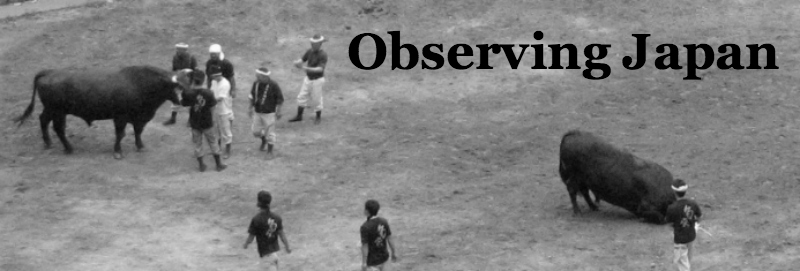On Friday, Prime Minister Abe Shinzō headed off (jp) to the mountains in Yamanashi prefecture for an eleven-day summer holiday. He leaves behind a growing debate in Tokyo about the wisdom of proceeding as planned with the consumption tax hike scheduled to be phased in from 2014-2015 (5% to 8% in April 2014, 8% to 10% in October 2015). Abe has said he will make his decision about the tax sometime over the next two months, leaving proponents and opponents of the hike to make their cases once again.
Arguably the supporters of the tax hike won several victories this week.
First, at the start of the week the IMF advised the Japanese government to stick to the plan as concluded in 2012, arguing that the tax hike will signal the government's commitment to fiscal restructuring and will therefore bolster investor confidence. The IMF has been saying that the consumption tax rate should rise to 15% for years now, so its advice for Japan is not new. But the fund's intervention gives proponents an important international backer as they make their case to the prime minister.
The next victory for proponents of the hike came on Thursday. Bank of Japan President Kuroda Haruhiko, speaking to the press after the BOJ policy board's regular meeting, voiced his support for raising the consumption tax and said (jp) that the BOJ's radical monetary policies and the planned hike were not incompatible. Like the IMF, Kuroda stressed the importance of reassuring investors that the Japanese government is serious about getting its financial house in order.
Finally, on Friday the Nikkei Shimbun ran a major article (jp; registration required) — basically an editorial — addressed to senior government officials who are "nervous" about the consumption tax increase that sought to reassure them that raising the consumption tax next year would not be like raising the consumption tax from 3% to 5% in 1997. The article opens by explaining that the 1997 hike came in the midst of a regional financial crisis and at a time when the balance sheets of Japanese banks and corporations were loaded with bad debts. Having established that 1997 was a particularly bad time to raise the consumption tax, Nikkei pivots to say that since banks and businesses have more "stamina" today, it's appropriate to take on the challenge of the national debt in order to reassure global financial markets, which, Nikkei reminds us, are roughly three times larger than they were in 1995. With that in mind, the article warns that at the first sign that the government is not serious about raising the tax, investors will short Japan in a heartbeat.
As arguments on behalf of austerity go, there is nothing earth shattering in the Nikkei article, in fact it contains pretty much the same arguments that Paul Krugman has critiqued for years, including in this 2010 column: the "confidence fairy" and the "bond vigilantes." But the arguments are less important than the reality that Japan's powers that be are lined up behind raising on the consumption tax on schedule in April 2014. The tax hike not only has the support of the BOJ president and Japan's leading business daily, but also the head of Keidanren (jp) its most powerful business lobby; Amari Akira, Abe's own minister for economic and fiscal policy; and leading members of the LDP, which has, after all, campaigned on raising the consumption tax for the last several elections. Of course, it almost goes without saying that the ministry of finance wants to see the tax hike proceed as scheduled.
The forces arrayed against the tax, at least at the elite level, are thinner. Hamada Kōichi and Honda Etsuro, Abe's leading economic advisers, have both voiced skepticism about the current tax hike plan, with Professor Honda's arguing (jp) that the tax should be phased in at 1% a year rather than in two phases. Saitō Tetsuo, the chair of LDP coalition partner Komeitō's taxation committee, has stressed the need to take economic conditions into consideration when deciding whether to go forward with the hike. Beyond elite circles, perhaps most significant fact is that the public is overwhelmingly opposed to the tax hike: Asahi's post-election opinion poll found (jp) 58% opposed and only 30% in favor.
Given that sustainable, robust growth is still far from assured — and that wages have yet to rise, suggesting that consumers would really feel the sting of the tax hike — the facts are probably on the side of the skeptics. The proponents still have to explain (1) why the confidence of global markets is so important when, as Michael Cucek reminds us, Japan is largely invulnerable to "bond vigilantes" and (2) why confidence would evaporate now as opposed to anytime over the past decade of swollen deficits. If anything, delaying the consumption tax hike should signal to financial markets that the Japanese government is serious about reviving Japan's economy.
But this week shows that the facts have an uphill battle against a good portion of the Japanese establishment (with the support of international actors like the IMF). After finally securing a plan in 2012 to raise the consumption tax, they are not about to let the Abe government back out of its commitment. With the final decision resting on Abe's shoulders, this issue is as good a chance as any for Abe to show that he can be the strong, decisive leader he claims to be.
